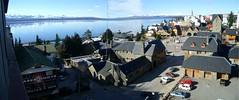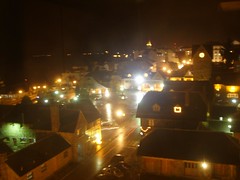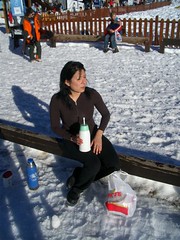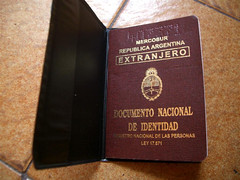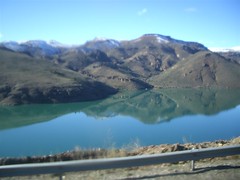76. Why can't we be friends? (Bariloche, Argentina)
The inhabitants of the largest city in any country often seem to get a bad rap throughout the rest of that country. Often those who live in the largest city have more disposable income, more expensive cars and houses, and more entertainment options (international concerts, theatres etc), which gives them a superiority complex over their small town cousins. They may also have more hectic lifestyles, live with more pollution, and more stress. Obviously, these factors make those who live in the largest city different from those in the rest of that country. In NZ, for example, the term JAFA (just another f'in Aucklander) is used with disdain when referring to those from Auckland, the largest city. I guess it's much the same in other countries (Sydney, New York, Madrid, Paris).
The biggest divide between a major city and the rest of the country that I've seen is in Buenos Aires. To start with, porteños, as the inhabitants of Buenos Aires are called, have little regard for the rest of the country - many of them think of Argentina as consisting of Buenos Aires + places to take a holiday. It's often said that BsAs has the highest number of plastic surgeons and the highest number of psychiatrists per capita in the world. I have my doubts that that statistic is still true, but it does offer a hint at the porteño psyche. Throughout the rest of Argentina (and this view has spread to other countries in South America) porteños are thought of as being proud, arrogant, rude and neurotic. A well-known joke goes "How does a porteño commit suicide? -He climbs to the top of his ego and jumps off.
This South American view of porteños may contrast with what the typical expat encounters. Just about every expat blog I've read has said that Argentineans are fun and really friendly. Of course this depends on the circumstances - as in most large cities you're unlikely to make a new friend by random chance - say in the street or a bar, or even your neighbours in the same building. People here are super-wary of strangers, more so than anywhere I've lived. But, if introduced to someone through mutual friends obviously that person will make your acquaintance. Everything normal so far.
However, making the leap from an acquaintance to a friend, I found, was difficult. I made a fair few acquaintances through Argentines that I knew before I came to BA and then through my girlfriend, and while we'd have a great time hanging together with our mutual friends, they'd usually not turn up to a party of mine if it was on my turf - I'd only see these people on our mutual friends' turf. It took me a long time, and a few no-shows to realise that these people probably never will turn up so eventually I stopped inviting them, but we stayed acquaintances.
Another anomaly I found with my friends here, not my acquaintances, was they were very lazy when it came to returning calls or meeting on time. If we were gonna meet at 10 that would mean to expect them any time between 10:30 and 11:30. Sometimes they wouldn't even turn up at all! Calls to cellphones and text messages would simply go unanswered. This sort of behaviour I find unacceptable, and quite immature. Especially the keeping people waiting. But it wasn't only happening to me - I'd see my girlfriend's friends doing the same crap with her. So I let it slide. Other expats have told me the same happens to them, that their Argentine friends are notoriously unreliable.
Anyone who's tried to do business here will point out that in the business world it's often the same. Appointments are often not kept without even a courtesy phone call. Employees don't turn up for work and they won't even call in to lie that they're sick. They'll just switch the mobile off and stay in bed. The concept of time = money doesn't seem to have sunken in here, especially if it's your time they're wasting.
A report I read yesterday conducted by online address book company plaxo said that Argentines have more contacts in their plaxo address books on average than any other country, with an average of 479. I've spoken about friendship with a couple of Argentines I know, and they both told me that they have a lot of acquaintances. But they also tell me they have few friends.
Anyway. Although I had a lot of friends and acquaintances after my first two months in BA, by the time I left BA the number of Argentine friends I had left I could count on one hand. I'm not saying it's like that for every expat that comes here, but that was how it was for me. I'm hoping that the behaviour I saw was only a porteño trait, and that I'll have more luck with friends here in Bariloche. Although since this is a tourist town, with lots of comers and goers, I kind of doubt it. Maybe I would have had more luck if I took up a social hobby, like tango...
Here in Bariloche life's carrying on slowly. The weather's been great for the last 2 weeks, sunny days, no snow, and even warm (24°C one day last week!). A preview of springtime. I'm happy with the change of weather, although the skiiers and snowboarders aren't, as the snow is melting.
A tradition here in Argentina is that to celebrate the end of their final year of high school, the entire class takes a class trip to Bariloche, between August and December. So the town continues to be full of kids travelling in packs of up to 50, clapping in unison and singing football songs, dressed in identical (sponsored) jackets. It's a bit like schoolies week in Surfer's Paradise, Australia, only here it's spread out over a few months.
The biggest divide between a major city and the rest of the country that I've seen is in Buenos Aires. To start with, porteños, as the inhabitants of Buenos Aires are called, have little regard for the rest of the country - many of them think of Argentina as consisting of Buenos Aires + places to take a holiday. It's often said that BsAs has the highest number of plastic surgeons and the highest number of psychiatrists per capita in the world. I have my doubts that that statistic is still true, but it does offer a hint at the porteño psyche. Throughout the rest of Argentina (and this view has spread to other countries in South America) porteños are thought of as being proud, arrogant, rude and neurotic. A well-known joke goes "How does a porteño commit suicide? -He climbs to the top of his ego and jumps off.
This South American view of porteños may contrast with what the typical expat encounters. Just about every expat blog I've read has said that Argentineans are fun and really friendly. Of course this depends on the circumstances - as in most large cities you're unlikely to make a new friend by random chance - say in the street or a bar, or even your neighbours in the same building. People here are super-wary of strangers, more so than anywhere I've lived. But, if introduced to someone through mutual friends obviously that person will make your acquaintance. Everything normal so far.
However, making the leap from an acquaintance to a friend, I found, was difficult. I made a fair few acquaintances through Argentines that I knew before I came to BA and then through my girlfriend, and while we'd have a great time hanging together with our mutual friends, they'd usually not turn up to a party of mine if it was on my turf - I'd only see these people on our mutual friends' turf. It took me a long time, and a few no-shows to realise that these people probably never will turn up so eventually I stopped inviting them, but we stayed acquaintances.
Another anomaly I found with my friends here, not my acquaintances, was they were very lazy when it came to returning calls or meeting on time. If we were gonna meet at 10 that would mean to expect them any time between 10:30 and 11:30. Sometimes they wouldn't even turn up at all! Calls to cellphones and text messages would simply go unanswered. This sort of behaviour I find unacceptable, and quite immature. Especially the keeping people waiting. But it wasn't only happening to me - I'd see my girlfriend's friends doing the same crap with her. So I let it slide. Other expats have told me the same happens to them, that their Argentine friends are notoriously unreliable.
Anyone who's tried to do business here will point out that in the business world it's often the same. Appointments are often not kept without even a courtesy phone call. Employees don't turn up for work and they won't even call in to lie that they're sick. They'll just switch the mobile off and stay in bed. The concept of time = money doesn't seem to have sunken in here, especially if it's your time they're wasting.
A report I read yesterday conducted by online address book company plaxo said that Argentines have more contacts in their plaxo address books on average than any other country, with an average of 479. I've spoken about friendship with a couple of Argentines I know, and they both told me that they have a lot of acquaintances. But they also tell me they have few friends.
Anyway. Although I had a lot of friends and acquaintances after my first two months in BA, by the time I left BA the number of Argentine friends I had left I could count on one hand. I'm not saying it's like that for every expat that comes here, but that was how it was for me. I'm hoping that the behaviour I saw was only a porteño trait, and that I'll have more luck with friends here in Bariloche. Although since this is a tourist town, with lots of comers and goers, I kind of doubt it. Maybe I would have had more luck if I took up a social hobby, like tango...
Here in Bariloche life's carrying on slowly. The weather's been great for the last 2 weeks, sunny days, no snow, and even warm (24°C one day last week!). A preview of springtime. I'm happy with the change of weather, although the skiiers and snowboarders aren't, as the snow is melting.
A tradition here in Argentina is that to celebrate the end of their final year of high school, the entire class takes a class trip to Bariloche, between August and December. So the town continues to be full of kids travelling in packs of up to 50, clapping in unison and singing football songs, dressed in identical (sponsored) jackets. It's a bit like schoolies week in Surfer's Paradise, Australia, only here it's spread out over a few months.


